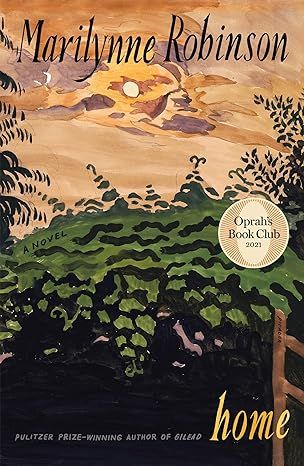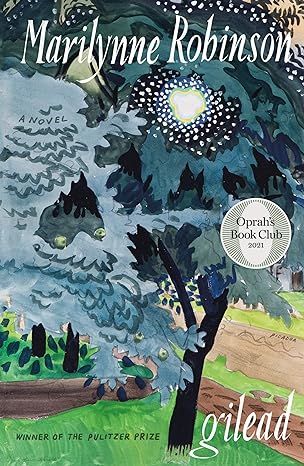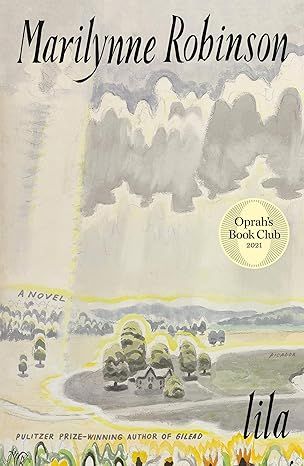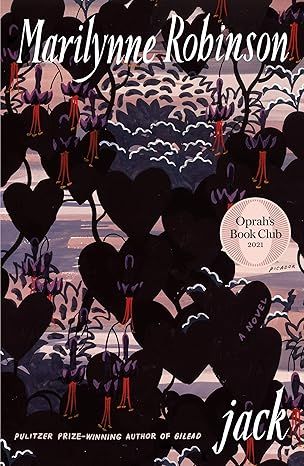Home (Oprah's Book Club): A Novel
4.2
-
3,734 ratings
A NEW YORK TIMES BESTSELLER • OPRAH’S BOOK CLUB PICK • NATIONAL BOOK AWARD FINALIST • A NEW YORK TIMESE NOTABLE BOOK • WINNER OF THE LOS ANGELES TIMES BOOK PRIZE
A WASHINGTON POST BEST BOOK OF THE YEAR • A LOS ANGELES TIMES BEST BOOK OF THE YEAR • A SAN FRANCISCO CHRONICLE BEST BOOK OF THE YEAR
“[Robinson's] prose is our flight out, a keen instrument of vision and transcendence.” —O, the Oprah Magazine
Hailed as "incandescent," "magnificent," and "a literary miracle" (Entertainment Weekly), hundreds of thousands of readers were enthralled by Marilynne Robinson's Gilead. Now Robinson returns with a brilliantly imagined retelling of the prodigal son parable, set at the same moment and in the same Iowa town as Gilead.
A luminous and healing book about families, family secrets, and faith from one of America's most beloved and acclaimed authors.
The Reverend Boughton's hell-raising son, Jack, has come home after twenty years away. Artful and devious in his youth, now an alcoholic carrying two decades worth of secrets, he is perpetually at odds with his traditionalist father, though he remains his most beloved child. As Jack tries to make peace with his father, he begins to forge an intense bond with his sister Glory, herself returning home with a broken heart and turbulent past.
Home is a luminous and healing book about families, family secrets, and faith from one of America's most beloved and acclaimed authors.
Kindle
$9.99
Available instantly
Audiobook
$0.00
with membership trial
Hardcover
$7.69
Paperback
$10.75
Ships from
Amazon.com
Payment
Secure transaction
ISBN-10
1250784026
ISBN-13
978-1250784025
Print length
336 pages
Language
English
Publisher
Picador Paper
Publication date
August 03, 2020
Dimensions
5.35 x 0.89 x 8.34 inches
Item weight
9.8 ounces
Frequently bought together
Popular highlights in this book
Experience had taught them that truth had sharp edges and hard corners, and could be seriously at odds with kindness.
Highlighted by 806 Kindle readers
Home. What kinder place could there be on earth, and why did it seem to them all like exile?
Highlighted by 708 Kindle readers
What an embarrassment that was, being somewhere because there was nowhere else for you to be.
Highlighted by 539 Kindle readers
Product details
ASIN :
B0018QSNYU
File size :
4202 KB
Text-to-speech :
Enabled
Screen reader :
Supported
Enhanced typesetting :
Enabled
X-Ray :
Enabled
Word wise :
Enabled
Editorial reviews
Amazon.com Review
Amazon Best of the Month, September 2008: "What does it mean to come home?" In one way or another, every character in Home is searching for that answer. Glory Boughton, now 38 and lovelorn, has returned to Gilead to care for her dying father. Her wayward brother Jack also finds his way back, though his is an uneasy homecoming, reverberating with the scandal that drove him away twenty years earlier. Glory and Jack unravel their stories slowly, speaking to each other more in movements than in words--a careful glance here, a chair pulled out from the table there--against a domestic backdrop so richly imagined you may be fooled into believing their house is your own. Meanwhile, their father, whose ebullient love for his children is a welcome counterpoint to Glory and Jack's conflicted emotions, experiences his own kind of reckoning as he yearns to understand his troubled son. There is a simplicity to this story that belies the complexity of its characters--they are bound together by a profound capacity for love and by an equally powerful sense of private conviction that tries the ties that bind, but never breaks them. It's a delicate sort of tension that you think would resist exposition--and in fact these characters seem to want nothing more than, as Glory says, to treat "one another's deceptions like truth"--but Marilynne Robinson's fine, tender prose imbues this family's secrets with an overwhelming grace. --Anne Bartholomew
From Publishers Weekly
Starred Review. Robinson's beautiful new novel, a companion piece to her Pulitzer Prize–winning Gilead, is an elegant variation on the parable of the prodigal son's return. The son is Jack Boughton, one of the eight children of Robert Boughton, the former Gilead, Iowa, pastor, who now, in 1957, is a widowed and dying man. Jack returns home shortly after his sister, 38-year-old Glory, moves in to nurse their father, and it is through Glory's eyes that we see Jack's drama unfold. When Glory last laid eyes on Jack, she was 16, and he was leaving Gilead with a reputation as a thief and a scoundrel, having just gotten an underage girl pregnant. By his account, he'd since lived as a vagrant, drunk and jailbird until he fell in with a woman named Della in St. Louis. By degrees, Jack and Glory bond while taking care of their father, but when Jack's letters to Della are returned unopened, Glory has to deal with Jack's relapse into bad habits and the effect it has on their father. In giving an ancient drama of grace and perdition such a strong domestic setup, Robinson stakes a fierce claim to a divine recognition behind the rituals of home. (Sept.)
Copyright © Reed Business Information, a division of Reed Elsevier Inc. All rights reserved.
Review
Praise for Gilead:
“Gilead is a beautiful work—demanding, grave and lucid . . . Robinson’s words have a spiritual force that’s very rare in contemporary fiction.” —James Wood, The New York Times Book Review
Read more
Sample
“Home to stay, Glory! Yes!” her father said, and her heart sank. He attempted a twinkle of joy at this thought, but his eyes were damp with commiseration. “To stay for a while this time!” he amended, and took her bag from her, first shifting his cane to his weaker hand. Dear God, she thought, dear God in heaven. So began and ended all her prayers these days, which were really cries of amazement. How could her father be so frail? And how could he be so recklessly intent on satisfying his notions of gentlemanliness, hanging his cane on the railing of the stairs so he could, dear God, carry her bag up to her room? But he did it, and then he stood by the door, collecting himself.
“This is the nicest room. According to Mrs. Blank.” He indicated the windows. “Cross ventilation. I don’t know. They all seem nice to me.” He laughed. “Well, it’s a good house.” The house embodied for him the general blessedness of his life, which was manifest, really indisputable. And which he never failed to acknowledge, especially when it stood over against particular sorrow. Even more frequently after their mother died he spoke of the house as if it were an old wife, beautiful for every comfort it had offered, every grace, through all the long years. It was a beauty that would not be apparent to every eye. It was too tall for the neighborhood, with a flat face and a flattened roof and peaked brows over the windows. “Italianate,” her father said, but that was a guess, or a rationalization. In any case, it managed to look both austere and pretentious despite the porch her father had had built on the front of it to accommodate the local taste for socializing in the hot summer evenings, and which had become overgrown by an immense bramble of trumpet vines. It was a good house, her father said, meaning that it had a gracious heart however awkward its appearance. And now the gardens and the shrubbery were disheveled, as he must have known, though he rarely ventured beyond the porch.
Not that they had been especially presentable even while the house was in its prime. Hide-and-seek had seen to that, and croquet and badminton and baseball. “Such times you had!” her father said, as if the present slight desolation were confetti and candy wrappers left after the passing of some glorious parade. And there was the oak tree in front of the house, much older than the neighborhood or the town, which made rubble of the pavement at its foot and flung its imponderable branches out over the road and across the yard, branches whose girths were greater than the trunk of any ordinary tree. There was a torsion in its body that made it look like a giant dervish to them. Their father said if they could see as God can, in geological time, they would see it leap out of the ground and turn in the sun and spread its arms and bask in the joys of being an oak tree in Iowa. There had once been four swings suspended from those branches, announcing to the world the fruitfulness of their household. The oak tree flourished still, and of course there had been and there were the apple and cherry and apricot trees, the lilacs and trumpet vines and the day lilies. A few of her mother’s irises managed to bloom. At Easter she and her sisters could still bring in armfuls of flowers, and their father’s eyes would glitter with tears and he would say, “Ah yes, yes,” as if they had brought some memento, these flowers only a pleasant reminder of flowers.
Why should this staunch and upright house seem to her so abandoned? So heartbroken? The eye of the beholder, she thought. Still, seven of her father’s children came home as often as they could manage to, and telephoned, and sent notes and gifts and crates of grapefruit. Their own children, from the time they could grasp a crayon and scrawl, were taught to remember Grandpa, then Great-grandpa. Parishioners and their children and grandchildren looked in on her father with a faithfulness that would have taxed his strength if the new minister had not hinted at the problem. And there was Ames, her father’s alter ego, in whom he had confided so long and so utterly that he was a second father to them all, not least in the fact of knowing more about them than was entirely consistent with their comfort. Sometimes they made their father promise not to tell anyone, by which he knew they meant Reverend Ames, since he was far too discreet to repeat any confidence, except in the confessional of Ames’s stark bachelor kitchen, where, they suspected, such considerations were forgotten. And what was their father not to tell? How they informed on Jack, telling him what Jack had said, what Jack had done or seemed inclined to do.
“I have to know,” their father said. “For his sake.” So they told on their poor scoundrel brother, who knew it, and was irritated and darkly amused, and who kept them informed or misinformed and inspired urgent suspicions among them which they felt they had to pass on, whatever their misgivings, to spare their father having to deal with the sheriff again. They were not the kind of children to carry tales. They observed a strict code against it among themselves, in fact, and they made an exception of Jack only because they were afraid to do otherwise. “Will they put him in jail?” they asked one another miserably when the mayor’s son found his hunting rifle in their barn. If they had only known, they could have returned it and spared their father surprise and humiliation. At least with a little warning he could have composed himself, persuaded himself to feel something less provocative than pure alarm.
But no, they did not put him in jail. Jack, standing beside his father, made yet another apology and agreed to sweep the steps of the city hall every morning for a week. And he did leave the house early every morning. Leaves and maple wings accumulated at city hall until the week was over and the mayor swept them up. No. His father would always intercede for him. The fact that his father was his father usually made intercession unnecessary. And that boy could apologize as fluently as any of the rest of the Boughtons could say the Apostles’ Creed.
A decade of betrayals, minor and major, was made worse by awareness on every side that they were all constantly alert to transgression and its near occasion, and made worse still by the fact that Jack never repaid them in kind, though this may only have been because their own mischief was too minor to interest him. To say they shared a bad conscience about Jack to this day would be to overstate the matter a little. No doubt he had his own reasons for staying away all these years, refusing all contact with them. Assuming, please God, he was alive. It was easy to imagine in retrospect that Jack might have tired of it all, even though they knew he made a somber game of it. Sometimes he had seemed to wish he could simply trust a brother, a sister. They remembered that from time to time he had been almost candid, had spoken almost earnestly. Then he would laugh, but that might have been embarrassment.
They were attentive to their father all those years later, in part because they were mindful of his sorrow. And they were very kind to one another, and jovial, and fond of recalling good times and looking through old photographs so that their father would laugh and say, “Yes, yes, you were quite a handful.” All this might have been truer because of bad conscience, or, if not that, of a grief that felt like guilt. Her good, kind, and jovial siblings were good, kind, and jovial consciously and visibly. Even as children they had been good in fact, but also in order to be seen as good. There was something disturbingly like hypocrisy about it all, though it was meant only to compensate for Jack, who was so conspicuously not good as to cast a shadow over their household. They were as happy as their father could wish, even happier. Such gaiety! And their father laughed at it all, danced with them to the Victrola, sang with them around the piano. Such a wonderful family they were! And Jack, if he was there at all, looked on and smiled and took no part in any of it.
Now, as adults, they were so careful to gather for holidays that Glory had not seen the house empty and quiet in years, since she was a girl. Even when the others had all gone off to school her mother was there, and her father was still vigorous enough to make a little noise in the house with coming and going, singing, grumbling. “I don’t know why he has to slam that door!” her mother would say, when he was off to tend to some pastoral business or to play checkers with Ames. He almost skipped down the steps. The matter of Jack and the girl and her baby stunned him, winded him, but he was still fairly robust, full of purpose. Then, after his frailty finally overwhelmed him, and after their mother died, there was still the throng of family, the bantering and bickering child cousins who distracted and disrupted adult conversation often enough to ward off inquiry into the specifics of her own situation. Still teaching, still engaged to be married, yes, long engagements are best. Twice the fiancé had actually come home with her, had shaken hands all around and smiled under their tactful scrutiny. He had been in their house. He could stay only briefly, but he had met her father, who claimed to like him well enough, and this had eased suspicions a little. Theirs and hers. Now here she was alone with poor old Papa, sad old Papa, upon whose shoulder much of Presbyterian Gilead above the age of twenty had at some time wept. No need to say anything, and no hope of concealing anything either.
The town seemed different to her, now that she had returned there to live. She was thoroughly used to Gilead as the subject and scene of nostalgic memory. How all the brothers and sisters except Jack had loved to come home, and how ready they always were to leave again. How dear the old place and the old stories were to them, and how far abroad they had scattered. The past was a very fine thing, in its place. But her returning now, to stay, as her father said, had turned memory portentous. To have it overrun its bounds this way and become present and possibly future, too—they all knew this was a thing to be regretted. She rankled at the thought of their commiseration.
Most families had long since torn down their outbuildings and sold off their pastures. Smaller houses in later styles had sprung up between them in sufficient numbers to make the old houses look increasingly out of place. The houses of Gilead had once stood on small farmsteads with garden patches and berry patches and henhouses, with woodsheds, rabbit hutches, and barns for the cow or two, the horse or two. These were simply the things life required. It was the automobile that changed that, her father said. People didn’t have to provide for themselves the way they once did. It was a loss—there was nothing like chicken droppings to make flowers thrive.
Boughtons, who kept everything, had kept their land, their empty barn, their useless woodshed, their unpruned orchard and horseless pasture. There on the immutable terrain of their childhood her brothers and sisters could and did remember those years in great detail, their own memories, but more often the pooled memory they saw no special need to portion out among them. They looked at photographs and went over the old times and laughed, and their father was well pleased. Boughton property lay behind the house in a broad strip that spanned two blocks, now that the town had grown and spread enough to have blocks. For years a neighbor—they still called him Mr. Trotsky because Luke, home from college, had called him that—planted alfalfa on half of it, and her father sometimes tried to find words for his irritation about this. “If he would just ask me,” he said. She was too young at the time to understand the alfalfa putsch, and she was in college when she began to see what the old stories meant, that they were really the stirring and smoldering of old fires that had burned furiously elsewhere. It pleased her to think that Gilead was part of the world she read about, and she wished she had known Mr. Trotsky and his wife, but old as they were, they had abandoned Gilead to its folly in a fit of indignation about which no one knew the particulars, just at the end of her sophomore year.
The land that was the battlefield would have been unused if the neighbor had not farmed it, and alfalfa was good for the soil, and the joke and perhaps the fact was that the neighbor, who seemed otherwise unemployed and who railed against the cash nexus, donated his crop to a rural cousin, who in exchange donated to him a certain amount of money. In any case, her father could never finally persuade himself that objection was called for. The neighbor was also an agnostic and probably spoiling for an ethical argument. Her father seemed to feel he could not risk losing another one of those, after the embarrassing episode when he tried to prevent the town from putting a road through his land, on no better grounds than that his father would have opposed it, and his grandfather. He had realized this during a long night when his belief in the rightness of his position dissipated like mist, under no real scrutiny. There was simply the moment, a little after 10:00 p.m., when the realization came, and then the seven hours until dawn. His case looked no better by daylight, so he wrote a letter to the mayor, simple and dignified, making no allusion to the phrase “grasping hypocrite,” which he had thought he heard the mayor mutter after him as he walked away from a conversation he had considered pleasant enough. He told all of them about this at the dinner table and used it more than once as a sermon illustration, since he did devoutly believe that when the Lord gave him moral instruction it was not for his use only.
Each spring the agnostic neighbor sat his borrowed tractor with the straight back and high shoulders of a man ready to be challenged. Unsociable as he was, he called out heartily to passersby like a man with nothing to hide, intending, perhaps, to make the Reverend Boughton know, and know the town at large knew, too, that he was engaged in trespass. This is the very act against which Christians leveraged the fate of their own souls, since they were, if they listened to their own prayers, obliged to forgive those who trespassed against them.
Her father lived in a visible state of irritation until the crop was in, but he was willing to concede the point. He knew the neighbor was holding him up to public embarrassment year after year, seed time and harvest, not only to keep fresh the memory of his ill-considered opposition to the road, but also to be avenged in some small degree for the whole, in his agnostic view unbroken, history of religious hypocrisy.
Read more
About the authors
Marilynne Robinson
Marilynne Robinson is the author of the bestselling novels "Lila," "Home" (winner of the Orange Prize), "Gilead" (winner of the Pulitzer Prize), and "Housekeeping" (winner of the PEN/Hemingway Award).
She has also written four books of nonfiction, "When I Was a Child I Read Books," "Absence of Mind," "Mother Country" and "The Death of Adam." She teaches at the University of Iowa Writers' Workshop.
She has been given honorary degrees from Brown University, the University of the South, Holy Cross, Notre Dame, Amherst, Skidmore, and Oxford University. She was also elected a fellow of Mansfield College, Oxford University.
Read more
Reviews
Customer reviews
4.2 out of 5
3,734 global ratings
HeatherL
5
Marilynne Robinson never disappoints
Reviewed in the United States on May 22, 2024
Verified Purchase
One of Robinson's four novels set in Gilead, Iowa, this novel is poignant and moving. She expresses profound truths via the thoughts and actions of her characters. Highly recommend!
M. Bones
5
Absolutely astonishing book but the audible version is intolerable
Reviewed in the United States on April 3, 2024
Verified Purchase
I have to say I enjoyed and admired this book more than Gilead and enough to make me want to read Gilead again—though I read it only months ago. The prose is as breathtaking as in Housekeeping and she doesn’t get as carried away with it as she occasionally did in that first book. Not having the ready excuse for sermonizing that Gilead provides also keeps her head above water and the clarity and depth of vision for all of the characters is truly extraordinary.
Unfortunately the narration for the audible version is so nauseatingly artificial & "poetic" that I simply couldn't listen to it, even when I was on a long drive. Very disappointing.
Read more
3 people found this helpful
Mac6uffin
5
Return to Gilead. Iowa, Not That Other One
Reviewed in the United States on May 3, 2024
Verified Purchase
When initially published, Home was a companion novel to Gilead, now part of a tetralogy. In Gilead we had elderly John Amos writing a novel-length letter to his young son knowing he wouldn't be around much longer. While it started with Amos's life and his family's story, it drifted into recent events regarding his best friend Reverend Robert Boughton on the occasion of Robert's son Jack returning after many years away. This novel centers on Glory, daughter of Robert, who has returned to her childhood home to take care of Robert near the end of his life. Jack returns as we read in the previous novel, and we see events from Glory's point of view. Marilynne Robinson reminds me of a midwestern Faulkner, with her beautiful prose and intertwining lives in small town Iowa. Full of internal thoughts and relationships, the ending reaches that bittersweet conclusion that the best stories often leave us with. Highly recommended.
Read more
Top Marilynne Robinson titles
View allSimilar Books
Best sellers
View all
The Tuscan Child
4.2
-
100,022
$8.39

The Thursday Murder Club: A Novel (A Thursday Murder Club Mystery)
4.3
-
155,575
$6.33

Sapiens: A Brief History of Humankind
4.6
-
140,302
$13.49

The Butterfly Garden (The Collector, 1)
4.3
-
88,556
$9.59

Things We Hide from the Light (Knockemout Series, 2)
4.4
-
94,890
$11.66

The Last Thing He Told Me: A Novel
4.3
-
154,085
$2.99

The Perfect Marriage: A Completely Gripping Psychological Suspense
4.3
-
143,196
$9.47

The Coworker
4.1
-
80,003
$13.48

First Lie Wins: A Novel (Random House Large Print)
4.3
-
54,062
$14.99

Mile High (Windy City Series Book 1)
4.4
-
59,745
$16.19

Layla
4.2
-
107,613
$8.99

The Locked Door
4.4
-
94,673
$8.53










